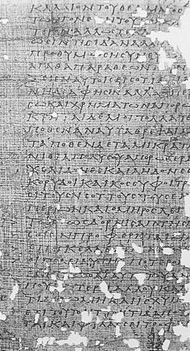Gaius Musonius Rufus Quotes
To relax the mind is to lose it.
The cosmos is administered by mind and providence.
It is not possible to live well today unless you treat it as your last day.
Given that all must die, it is better to die with distinction than to live long.
Choose to die well while you can; wait too long, and it might become impossible to do so.
Others have been in poor health from overindulgence and high living, before exile has provided strength, forcing them to live a more vigorous life.
Why do we criticize tyrants, when in fact we are much worse than they are? We have the same inclinations as they do; we just lack opportunities to act on them.
If one accomplishes some good albeit with toil, the toil passes, but the good remains; if one does something dishonorable albeit with pleasure, the pleasure passes, but the dishonor remains.
In our control is the most beautiful and important thing, the thing because of which even the god himself is happy— namely, the proper use of our impressions … we must concern ourselves absolutely with the things that are under our control and entrust the things not in our control to the universe.
Since it so happens that the human being is not soul alone, nor body alone, but a kind of synthesis of the two, the person in training must take care of both, the better part, the soul, more zealously; as is fitting, but also of the other, if he shall not be found lacking in any part that constitutes man.
Of the things that exist, God has put some in our control, others not in our control. In our control he has put the noblest and most excellent part by reason of which He is Himself happy, the power of using our impressions. For when this is correctly used, it means serenity, cheerfulness, constancy; it also means justice and law and self-control and virtue as a whole. But all other things He has not put in our control. Therefore we ought to become of like mind with God and, dividing things in like manner, we ought in every way to lay claim to the things that are in our control, but what is not in our control we ought to entrust to the universe and gladly yield to it whether it asks for our children, our country, our body, or anything whatsoever.
In general, of all creatures on earth man alone resembles God and has the same virtues that He has, since we can imagine nothing even in the gods better than prudence, justice, courage, and temperance. Therefore, as God, through the possession of these virtues, is unconquered by pleasure or greed, is superior to desire, envy, and jealousy; is high-minded, beneficent, and kindly (for such is our conception of God), so also man in the image of Him, when living in accord with nature, should be thought of as being like Him, and being like Him, being enviable, and being enviable, he would forthwith be happy, for we envy none but the happy. Indeed it is not impossible for man to be such, for certainly when we encounter men whom we call godly and godlike, we do not have to imagine that these virtues came from elsewhere than from man’s own nature.

